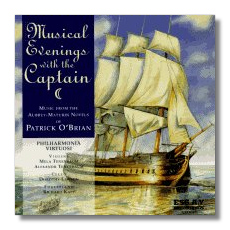
The Internet's Premier Classical Music Source
Related Links
- Latest Reviews
- More Reviews
-
By Composer
-
Collections
DVD & Blu-ray
Books
Concert Reviews
Articles/Interviews
Software
Audio
Search Amazon
Recommended Links
Site News
 CD Review
CD Review
Musical Evenings with the Captain

Music from the novel "Master and Commander" and other books in the Aubrey-Maturin series by Patrick O'Brian
- Pietro Antonio Locatelli:
- Sonata in G Major for 2 Violins & Continuo, Op. 5 #1 *
- Sonata in C minor for Violin & Continuo, Op. 6 #5 *
- Franz Joseph Haydn: Duet in D Major for Violin & Cello
- George Frideric Handel: Eight Pieces for Violin & Cello
- Luigi Boccherini: Sonata in D Major for Violin & Cello
- Jean Marie Léclair: Sonata in D minor for 2 Violins & Continuo *
Mela Tenenbaum, violin
* Alexandr Tenenbaum, violin
Dorothy Lawson, cello
Richard Kapp, fortepiano
ESS.A.Y Recordings CD1047 1996 DDD 75:45
ESS.A.Y's collection of pieces that might have been performed by novelist Patrick O'Brian's heroes Aubrey and Maturin is no mere marketing gambit. To recreate the ambiance of an early nineteenth century performance of these works, Richard Kapp substituted fortepiano for the original harpsichord in the continuo and researched the period's musical preferences – and he prevailed upon Patrick O'Brian himself to write the booklet notes.
Mela Tenenbaum, however, is not a period violinist; she and her colleagues (except, obviously, Richard Kapp and his fortepiano), like most players before the original-instruments movement began, bring the best sound and technique currently available to bear upon their recreation of the past. As in Tenenbaum's recordings of concertos by Locatelli and Vivaldi, her crisp and sprightly off-the-string bowings make for a plausible translation of the light and facile passagework that the older bow and violin fittings would have made possible for the period's violinists. If her rich but acidulous tone is not equally plausible, it nevertheless makes its own kind of sense, and is hardly jarring to musical sensibilities attuned to the tonal elegance of Heifetz, Stern, Kremer, and Mutter. In fact, if one violinist comes to mind as a comparison, both tonal and stylistic, it is Arthur Grumiaux, whose way with the literature of this period was so joyful and enlightened.
Tenenbaum is at her best in virtuosic movements like the finale of Locatelli's sonata, Op. 6, #5, in which her technical command is absolute. She is less prepossessing in simpler pieces, such as those by Handel, which, to be fair, are not at all easy to bring to life. But she and her cohorts adapt themselves to each of the many styles represented in the program, whether derived from Italian, French, or Austrian models. And their ensemble is razor sharp – a delight that must have eluded listeners at the captain's musical evenings.
Tenenbaum and Lawson extract especially impressive sonorities from Boccherini's sonata, and these sonorities, like those of all the works on the disc, are captured by a well-balanced and vivid recording. The bass range is exceptionally rich, but never at the expense of the ensemble.
The program and performances will have a much broader appeal than to readers of O'Brian's novels, essential though the disc may be to them. It can be heartily recommended to anyone who enjoys this repertoire in stunning modern performances superbly recorded.
Copyright © 1996, Robert Maxham




















